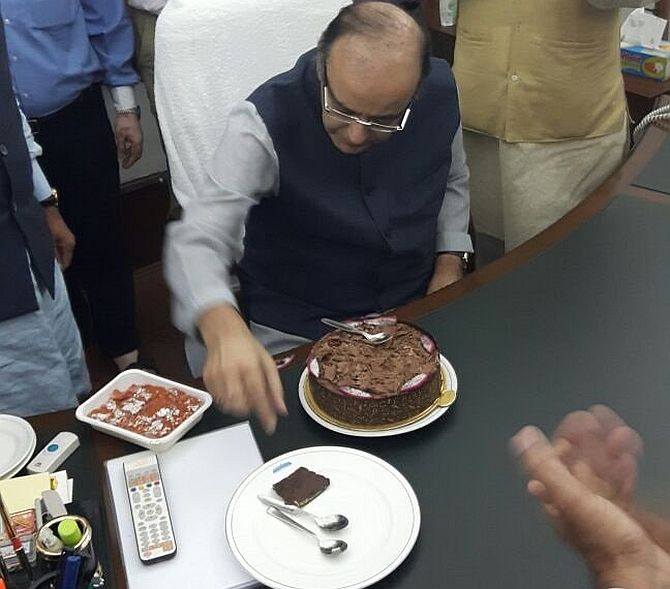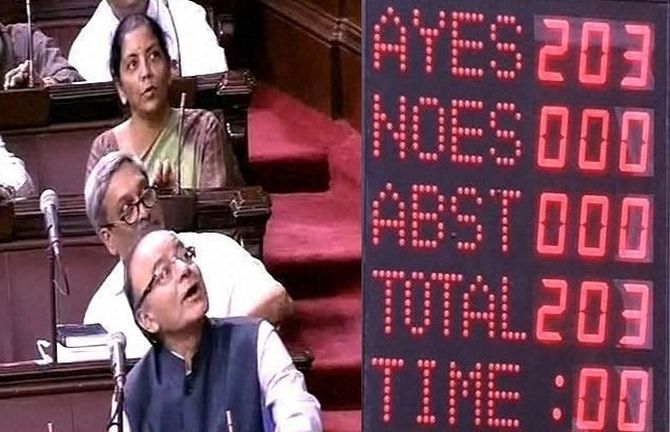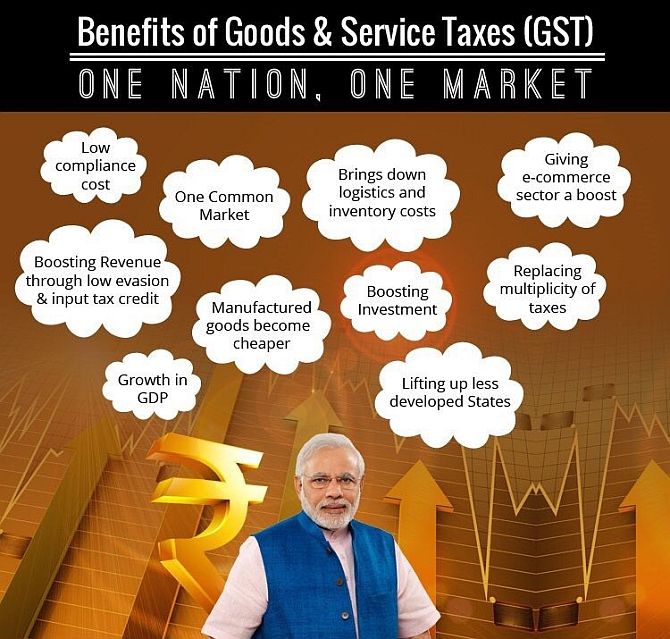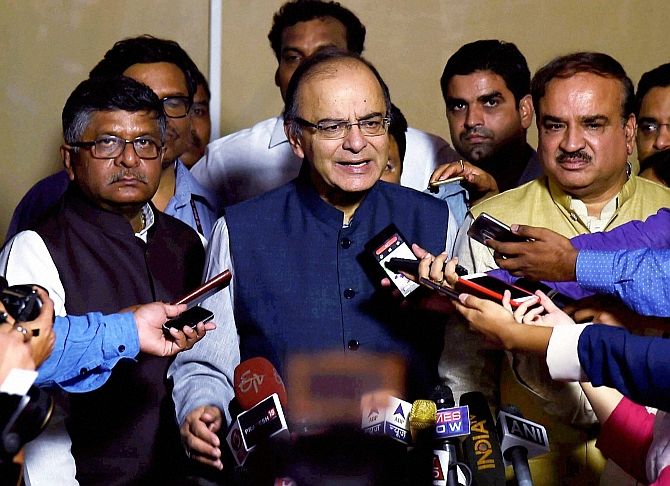In the biggest tax reform since Independence, the national sales tax or GST Bill was on Wednesday approved by the Rajya Sabha to replace a raft of different state and local taxes with a single unified value added tax system to turn the country into world's biggest single market.

The 66-year-old Constitution, which gives power to Centre to levy taxes like excise, and empowers states to collect retail sales taxes, was amended though the 122nd Constitution Amendment Bill.
Prime Minister Narendra Modi said the GST will "also be the best example of cooperative federalism" and "Together we will take India to new heights of progress".
The legislation was approved by the Upper House with 203 votes in favour and none against, after a seven-hour debate during which a rare bonhomie was witnessed among the ruling and the opposition parties.
Replying to the debate, Finance Minister Arun Jaitley said the GST rate will be kept "as low as possible" but did not commit to a specific rate despite opposition benches pressing for it.
"We will also try and keep the rate as low as possible, certainly much lower than what the present situation is. And as compliance increases, the possibility of that rate coming down further would be there," he said.
The tax rate, he said, would be decided by the GST Council comprising of Union finance minister and representatives of all 29 states.
"We must trust the sense of responsibility of the states who belong to the same political parties as us. Who in their last meeting said that our guiding principle is going to be -- one we will lower the burden of tax," he said.
The finance minister said presently 80 per cent of goods attract 12.5 per cent of Central excise duty while at the state level 55 per cent of items are charged with 14.5 per cent VAT or sales tax.

The weighted average of the two in 65 per cent of the items comes to 27 per cent. Adding cess, octroi and entry tax takes the figure to 30 per cent, he said.
In deciding the GST rate, "we are guided by two factors -- 27 per cent is too high, it is inflationary, it costs the people, so it should come down... the second they said we will collect what is essential for our present revenue requirement," he said.
Jaitley said members will have an opportunity to speak on subjects when the supporting GST Bill comes up in November.
The GST, he said, will make the system more efficient, increase tax compliance and tax avoidance will become more difficult as it will be detected at some stage or the other.
Also, there will be no cascading effect of tax on tax, he said adding there are certain items which will either attract lower rate of tax or no tax at all.
Ruling out GST impacting inflation, Jaitley said 54 per cent of goods in the basket used to calculate consumer price inflation are tax exempt and another 32 per cent attract low rate of tax. Only 15 per cent are taxed at standard rate.
The Goods and Service Tax, which was first proposed a decade back, is seen as potentially transformative for India's economy, adding as much as 2 percentage points to the GDP while also improving the ease of doing business and encourage investment in manufacturing.
It is also expected to result in greater tax compliance, boosting government revenues.
The GST will replace more than a dozen levies central and state levies, including central excise duty, service tax and central sales tax as well as VAT on sale of goods and entry tax, to make movement of goods seamless across 1.3 billion market. Instead of the good being taxed multiple times at different rates, under the new GST regime goods would be taxed at point of consumption.

The Bill passed on Wednesday will create a GST Council comprising Union Finance Minister and his counterparts from the states. This body will determine the final rate.
"As we stand today, the political objective is very clear. The rate has to come down, the rate must be reasonable. We will try for this for the most reasonable rate," the finance minister said.
He was responding to the major demand by most of the parties for capping the tax rate at 18 per cent.
Jaitley said the Chief Economic Advisor, who was quoted by Chidambaram and others, had suggested a rate of between 16.9 and 18.9 per cent which was not acceptable to the state finance ministers.
As a follow up to Wednesday's development, the CGST and IGST bills, which will be drafted by the Empowered Committee of state Finance Ministers, will be introduced in Parliament during the Winter Session.
Before the passage of the Constitution Amendment Bill, Congress insisted on an assurance by the government that the CSGT and IGST would be treated as Finance bill and not money bill.
Responding to this, Jaitley said, "We have absolutely no intention, in any way, to bypass the Constitutional provisions as far as requirements of the bill are concerned. We will fully comply with the Constitution and precedence."
He added that it would be "unreasonable" to give an assurance since he was not aware of the content of those bills, neither had the GST Council discussed the issue and nor was there any such precedence.
The finance minister, however, said the matter will be discussed with the opposition parties before moving ahead, an assurance which satisfied the Leader of Opposition Ghulam Nabi Azad.
Congress leader and former Finance Minister P Chidambaram earlier said the government is not obliged to bring those bills as money bills and in the interest of the country "you should give an assurance to the House".
On the additional one per cent manufacturing tax, he said experts were divided on the issue and many felt that it would have a cascading affect.
The proposal of imposing one per cent additional tax however, has been dropped.
The Constitution (122nd Amendment) Bill, 2014, that would lay the ground for roll out of Goods and Services Tax regime, was passed by the opposition-dominated Upper House after the government moved four amendments.

These included one on scrapping of the proposed tax of up to 1 per cent on inter-state transactions to compensate manufacturing states and another one promising to compensate states for any revenue loss in first five years of GST implementation.
The other amendments pertained to a new formulation on a dispute-resolution mechanism and an endorsement of the resolution by the empowered committee of state finance ministers on a revenue-neutral rate to bring down the incidence of tax on the common man while protecting revenues of states.
During the debate former finance minister and Congress leader P Chidambaram reiterated party's demand to keep GST rate below 18 per cent and asked government to specify its stand on the issue while including the rate in the subsequent GST bill. He also asked the Government not to convert the subsequent GST laws into money bills to bypass Rajya Sabha.
Money bills do not require approval of the Upper House and their mere passage in the Lok Sabha, where the ruling NDA has absolute majority, is enough for converting it into a law.
His twin demands found favour with other opposition leaders including Sitaram Yechury (CPIM), Naresh Agarwal (SP).
AIADMK was the only party which opposed the GST in totality.
This is a truly historic occasion: PM Modi
Prime Minister Narendra Modi hailed the passage of the Constitution Amendment Bill on GST by Rajya Sabha as a "truly historic occasion" and thanked leaders and members of all parties for their support.
He said the GST will "also be the best example of cooperative federalism" and "Together we will take India to new heights of progress".
Soon after the passage of the Constitution (122nd Amendment) Bill, 2014 to facilitate rollout of GST, Modi tweeted, "On this truly historic occasion of the passage of the GST Bill in the Rajya Sabha, I thank the leaders and members of all parties."
He added, "Our MPs must be congratulated for their path-breaking decision to give India an indirect tax system for the 21st century."
This reform, the prime minister said, will promote 'Make in India', help exports and thus boost employment while providing enhanced revenue.
"We continue to work with all parties & states to introduce a system that benefits all Indians & promotes a vibrant & unified national market," he added.









